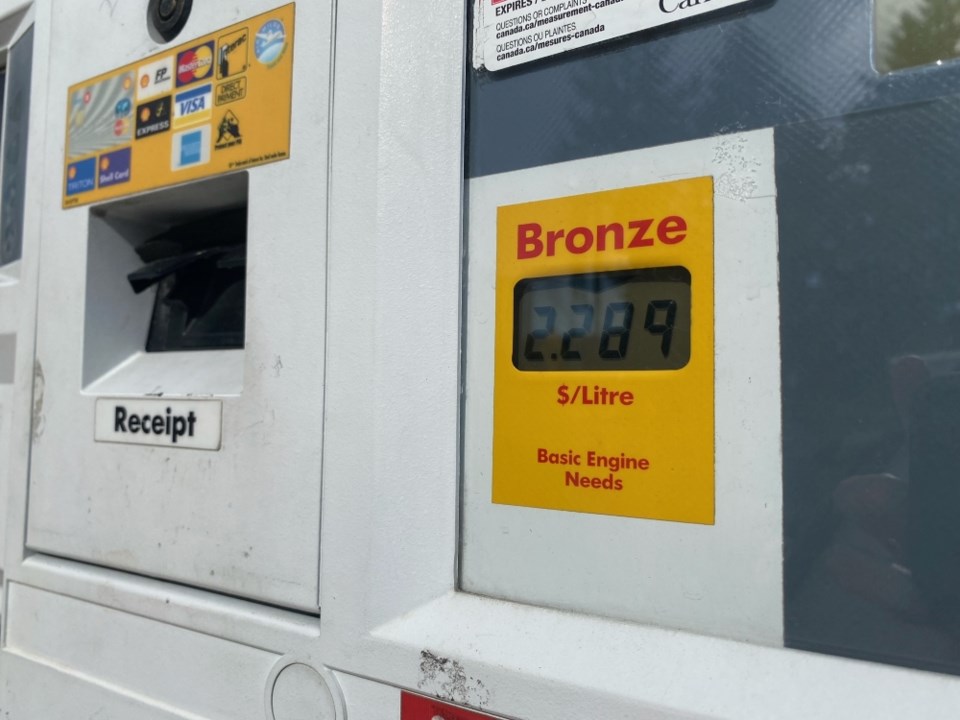As the May long weekend began, gas prices on the Sunshine Coast were once again higher than those in Vancouver — fuelling continued concerns from residents about price gouging.
On Friday, May 20, the cost of gas on the Sunshine Coast surpassed prices posted in Vancouver (which ranged from 214.9 to 224.9 cents per litre) and above the provincial average of 217.1. Regular gas was reported to be 228.9¢ at all three gas stations in Gibsons, and the same price at three locations in Sechelt (a fourth was selling regular gas at 226.9), according to GasBuddy.com. It was recorded at slightly higher in Powell River at 229.9¢ on the same day.
“I kind of get the sense that it's the same issue, except more exacerbated now,” Powell River-Sunshine Coast MLA Nicholas Simons told Coast Reporter on May 24.
No BC Transit tax on the Coast
Unlike Vancouver, the Sunshine Coast doesn’t pay the 18.8¢/litre TransLink motor fuel levy — so residents are asking why the price at the pump is higher here?
“That's a fair question, and the answer is that we're being kind of ripped off here,” Simons said. “The Sunshine Coast has borne a higher cost of gas for a significant period of time. Whether or not it can be called price gouging is a question that we need to still bolster. But there doesn't seem to be any other explanation.”
In 2019, the provincial government passed new legislation called the Fuel Prices Transparency Act to require gas companies to explain their pricing. Simons says there’s still hope that legislation will give the BC Utilities Commission (BCUC) information that can specifically identify why the prices are higher here, but there’s still a lot of resistance from gas companies.
Data going back to 2008 shows B.C. prices are higher than the national average. The highest average price for regular gas in Canada was recorded on May 18 this year at 201.8 cents per litre, but it was 219.3 in B.C. on the same day. The highest average last year across the country was 147.3, and 154.3 in B.C. (The Sunshine Coast is not included in GasBuddy’s recorded averages by metro areas.)
“When you see the prices go up in one part of Gibsons, you'll see the prices go up everywhere. And even when we see them go down, there is a big lag between other places going down and then us following suit,” Simons said. “It's frustrating, and it's certainly a burden for coastal residents.”
Russia-Ukraine war factor
In March, Coast Reporter reported on the factors that drive the prices at the pump — from crude oil to retail — and the politics at play. While the demand for gas was returning after pandemic-caused lows, Russia invaded Ukraine. The cost of crude oil spiked and the effect on the supply chain continues to be felt. On March 17, BCUC announced it will be “conducting additional monitoring of retail and wholesale price margins to ensure that fuel companies are not taking advantage of current market conditions.”
“Everybody realizes that the aggressive invasion of Ukraine has impacted gas prices significantly as well. But I think this issue that we're dealing with here in B.C. is, even with those great, bigger increases in other jurisdictions, we see this consistent disparity between other parts of B.C. and the Sunshine Coast,” Simons said. “Even those worldwide impacts on gas prices — which is the most significant impact — it's the difference that we see that I think causes us to have the concern that we're getting ripped off.”
There's still an unexplained discrepancy
While there’s some suggestion that the cost of transportation to the Coast by barge (like the island communities) is responsible for increased prices, Simons said the same kind of cost discrepancy can be seen in Squamish, where fuel can be transported by road and the transit tax also does not apply.
“The conclusion is that there's an unexplained price differential that the gas companies obviously are charging that don't reflect the difference as they should,” Simons said. “But it's confounding to most people as to why we are paying so much. We asked the question, and we still haven't got a proper explanation.”
Government-issued rebates of $110 through ICBC were announced earlier this year to address affordability, Simons pointed out but added the rebate doesn’t cover the entire extra cost. Lowering taxes may not be the answer, as the Sunshine Coast already has lower gas-related taxes but higher costs, Simons said.
Fuel Prices Transparency Act scrutiny hasn't come to pass
When asked if the pandemic has affected the implementation of the Fuel Prices Transparency Act, Simons said other issues may have taken attention away.
“There was hope that some scrutiny or accountability would lead to a more fair price, but we don't see that,” he said.
In 2020, residents on the Sunshine Coast demanded the provincial government regulate gas prices as they raised concerns of price gouging during a crisis. At the time, Simons said he expected the BCUC would do an inquiry into how the prices get set on the entire Sunshine Coast, and he contacted Solicitor General Mike Farnworth to look into the riding’s costs.
Simons will see the Minister of Energy, Mines and Low Carbon Innovation, Bruce Ralston, next week.
“We obviously have more work to do,” Simons said.



